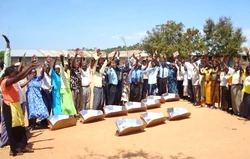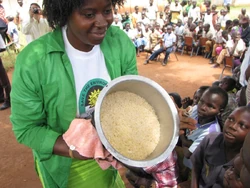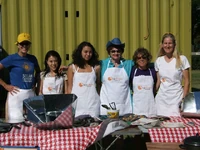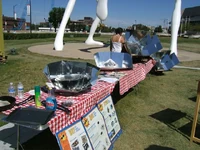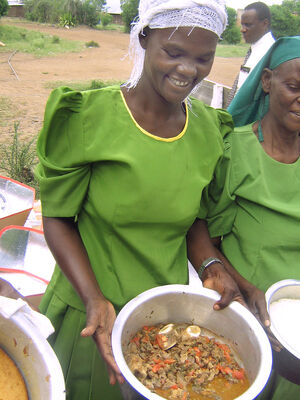
Kenyan women show off the food that they have cooked without the use of firewood.

Women in Kajido, Kenya stand with their CooKit solar cookers.
Solar Cookers International (SCI) is a 501(c)(3) nonprofit, non-governmental organization that spreads solar cooking awareness and skills worldwide, particularly in areas with plentiful sunshine and diminishing sources of cooking fuel. SCI has enabled 30,000 families in Africa to cook with the sun's energy, freeing women and children from the burdens of gathering wood and carrying it for miles. Tens of thousands of individuals and organization from all over the world have learned about solar cooking through SCI's international programs, education resources, and information exchange network.
SCI has consultative status with the UN Economic and Social Council.
SCI sponsors Solar Cooking Archive Wiki, an internationally recognized Internet resource for solar cooking information. Also SCI publishes Solar Cooker Review.
SCI won an Ashden Award in 2002 for their work with solar cookers in Kenya. In August 2006, SCI was the winner of the World Renewable Energy Award.
SCI is headquartered in Sacramento, California in the USA, and an office in Nairobi in Kenya.
Focus
SCI promotes solar cooking and solar water pasteurization worldwide, especially in developing countries where their use can literally save lives. According to the their website, SCI's mission is to assist "communities to use the power of the sun to cook food and pasteurize water for the benefit of people and environments" by focusing in the following areas:
- Influencing others in support of solar cooking and water pasteurization/testing.
- Developing programs, in partnership with others for the purpose of promoting solar cooking, and water pasteurization and testing. In addition, in parts of Kenya, the focus is to achieve independent spread of solar cooking and water pasteurization/testing.
- Facilitating broader access to solar cooking and water pasteurization/testing knowledge, including marketing educational materials and solar products.
- Partnering with other relief agencies to assist refugees and disaster relief with solar cooking and water pasteurization/testing training and support.
SCI is paving the way for mass solar cooker acceptance and use through promotion of such products as the CooKit solar cooker and the WAPI water pasteurization indicator; field projects in communities and refugee camps; development and dissemination of education resources; and advocacy with the United Nations and other governmental and non-governmental institutions.
Why solar cookers?
Depending on need and climate, there are many types, sizes and designs of appropriate solar cookers; however, SCI’s simple and effective CooKit is a low-cost cooker that is especially well suited for the developing world since it is made of cardboard and foil which are readily available materials in most communities.
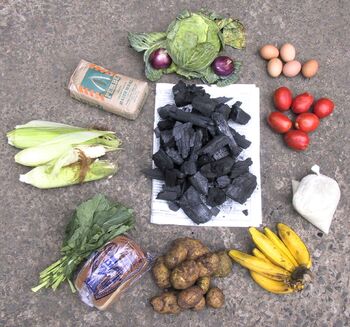
Each group of items costs 75 Kenya Shillings (about US$1) as does the pile of charcoal shown. By using a CooKit or other solar cooker, people can buy food instead of fuel.
Solar cooking is beneficial to anyone who lives where there is an abundance of sunshine, and especially where traditional cooking fuels are progressively being depleted. Women in developing countries often walk many miles to collect wood to cook with, or must purchase cooking fuel with meager incomes and/or trade food or goods for cooking fuels. In addition to this physical and monetary stress, women and children who habitually cook inside are subject to severe upper respiratory problems caused by indoor air pollution from smoky fires. Perhaps most disturbing is the fact that women and girls living in refugee camps risk injury, rape and even death when forced to forage for wood outside the compound.
In many cases, fuel wood is too scarce to use to boil water as well as cook with, so people drink water from contaminated water sources, causing millions to get sick and/or die every year from preventable waterborne diseases. An estimated 1.5 billion cases of diarrhea occur each year, resulting in the death of nearly 2 million children. Solar cookers provide a practical method of heating water to the point of pasteurization, requiring only time and the sun to kill the most common waterborne pathogens and making water safe to drink.
When there's no sun
SCI promotes the Integrated Cooking Method, whereby solar cookers are used in conjunction with fuel-efficient stoves and heat retention devices (sometimes called hay baskets) to cook food and pasteurize water with a minimum of fuel. By using the sun when possible, and supplementing with fuel-efficient cooking technologies, fuel wood consumption and subsequent deforestation around the world can be drastically reduced.
Water testing
In addition to the basic fundamentals of solar cooking and water pasteurization that SCI has promoted for years, SCI has developed a revolutionary method of simple scientific water testing that requires no electricity or refrigeration. Most rural areas are unable to adequately test their water because the process of gathering samples and transporting them to a certified laboratory in an urban area is simply too expensive. SCI’s Portable Microbiology Laboratory (PML) contains laboratory materials small enough to fit in a Ziplock bag, and has already been adopted by the Kenyan Ministry of Health and Water Resources Management Authority. We are working closely with these government institutions to bring accurate and reliable water testing to rural areas that previously had no practical resources available with which to test their water sources.
Programs and projects
SCI’s programs and projects fall into the following areas: international program development, education resources, humanitarian assistance, and advocacy. Several are described below:
Advocacy
SCI builds awareness for solar cooking and solar water pasteurization among policy makers including promoting closer collaboration with United Nations agencies. SCI was instrumental in the formation of the Solar Cookers International Association later renamed Solar Cookers World Network which is a association of an estimated 100 non-governmental organizations and government agencies, and 160+ individuals promoting solar cooking, water pasteurizing, and food processing. As this association grows and its system of regional networks takes hold, promoters in many regions should find it easier to get regionally-specific information and guidance. SCI has hosted regional and international solar cooking conferences, most recently the Solar Cookers International Conference held in Granada Spain in 2006.
International Program Development
The goal of the Sunny Solutions pilot program, begun in 2002, was to introduce and create a market for solar cookers in the Nyakach district, Nyanza province, Kenya. Partnering with Nyakach Community Development Association (NYACODA), SCI demonstrated solar cooking introducing the CooKit solar cooker and the WAPI water pasteurization indicator. Continued demonstration and marketing of solar cooking products was passed on to motivated local women trained as solar cooker representatives. SCI sponsored the project for 5 years with the goal that the program would become self-supporting which did not occur; nevertheless, there were several positive outcomes, including saving of time and of money (for new CooKit users), entrepreneurial outlet and additional income (for the solar cooker representatives), and experience in commercialization of the Cookit (for SCI). One year after the final evaluation of the project several solar cooker representatives have continued to share their knowledge and to make solar cookers available in the Nyakach district.
Education Resources
SCI's focus on education is evident in the solar cooking and related information available on their organization's website and the Solar Cooking Archive website, both of which they sponsor. A growing part of that archive is the site you are on now, the Solar Cooking Archive Wiki, a web-based collaborative encyclopedia powered by Wikia. This English language wiki started in 2006 was joined by Spanish and French language wikis in 2007. The English wiki includes over 1500 articles categorized by country, who's who, NGOs, manufacturers and vendors, solar cooking basics, and solar cooker designs. Also included is information regarding related technologies such as heat-retention cooking; water pasteurizing, solar food processing, solar food drying, solar autoclaving, and solar canning.
SCI continues to retain the non-wiki archive site so as not to break the thousand of links from around the world that point to it. Important links and pages have been redirected to the Solar Cooking Archive Wiki.
If you are interested in starting a solar cooking and/or water pasteurization project, please see Promoting solar cooking. You can also connect with people and programs in your own country by visiting our pages about solar cooking in each country. Basic information on solar cooking, frequently-asked questions and instructions on how to build various solar cooker models are also available. Large sections of the Solar Cooking Archive have been translated into French, Spanish, Catalan, and Portuguese, and translations of articles can be found in languages as varied as Farsi, Chinese, Vietnamese, German, Italian, Urdu, and Arabic.
Also available via the Internet are several key booklets published by SCI to help solar cooking promoters succeed. Our plans booklet, Solar Cookers: How to Make, Use and Enjoy, provides step-by-step construction plans for panel-type and box-type solar cookers. Our field guide, Spreading Solar Cooking, helps promoters plan solar cooking projects. Our trainer’s manual, Teaching Solar Cooking helps solar cooking instructors stay on task and monitor their students’ progress. All three booklets are available for download on the Archive, or for sale — along with solar cookers, cookbooks and related supplies on SCI’s web site. Booklets are mailed free of charge to select individuals and groups in developing countries where Internet access is difficult.
SCI’s Solar Cooker Review is another tool aimed at helping independent solar cooking promoters everywhere. In it, promoters exchange stories about solar cooker technology and dissemination, and learn from the successes and challenges of others. Thanks to you, our members and donors, each Solar Cooker Review is mailed free of charge three times per year to over 2,000 promoters and supporters outside the United States.
Last, but certainly not least, is SCI’s query response service. With custom responses to over 100 inquires each month, SCI has helped thousands of people answer important questions, find local experts, and access critical resources needed to successfully achieve their solar cooking goals.
If you would like to promote the work that SCI does locally and around the world, please consider becoming a member and submitting a donation on-line or to the address below. A majority of SCI's funding comes from individual donors and environmentally conscious people such as yourself. We will put your contribution to very good use by helping gain a better quality of life for people in communities much less fortunate than yours. Only with your continued support can SCI meet the ever-expanding needs of the worldwide solar cooking community.
News and recent developments
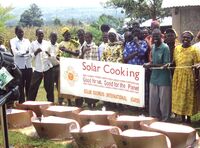
September 2008 training at the Kamusinde village
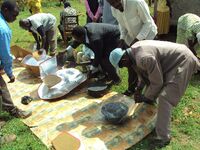
September 2008 training at the Kamusinde village
- September 2009: In September 2009 Solar Cookers International East Africa Office trainers traveled to the Kimilili District, Maeni Location, Kamusinde village of Kenya to train 36 community leaders involved with the Kamusinde Christian Community Based Organization in the use of solar cookers for cooking and water pasteurization.
- September 2009: Solar Cookers International seeking new Executive Director.
- April 2009: National Geographic covers the work of Solar Cookers International and others:
- 400px|National Geographic
- February 2009: The photo on the right shows a community group in the Siaya District of western Kenya that just had a demo by the Solar Cookers International East Africa Office. The demo was given in a local market place with local authority figures present and these wonderful "guardians" of nearly 350 orphans. More information...
- December 2008: WISER Brings Solar Cookers International to Muhuru - The WISER Muhuru Bay Advisory Board recently hosted Solar Cookers International for a full day solar cooking demonstration for the community. In just two hours, the team had cooked an entire meal full of fish, ugali, eggs, potatoes, beans, peanuts, vegetables and even a cake for more than 250 people in attendance with simply the sun. Solar cooking is easy, convenient, environmentally friendly, and in area where there is no electricity or running water, will literally save lives in Muhuru.
- November 2008: Solar Cookers International’s (SCI) recent collaboration with Uganda’s Solar Connect Association (SCA) was inspired by 13-year-old Max Ozimek, an 8th grader from Ohio, USA. Last year, Max researched solar cookers for a science fair project, and learned how the simple devices can make a huge difference for people that lack cooking fuel. Max volunteers at a hospice, where he befriended Father Alexander Inke, a priest from Obia, Uganda. While listening to Father Inke’s stories of life in Obia, Max was reminded of the African communities he had learned of while researching solar cookers and SCI’s projects abroad. Max thought solar cookers could help the women of Obia, many of whom must walk several miles to gather cooking fuel and household water. Max felt the need to help the small village of Obia, so he and his mother, Mary Lou, began raising funds and contacted SCI about how to proceed. Per SCI’s suggestion, Max and Mary Lou contacted SCA, which has promoted solar cookers in Uganda since the mid-1990s. SCA agreed to provide a five-day integrated cooking training for 22 women that Father Inke identified as community leaders capable of teaching others. Kawesa Mukasa and Olivia Kanyesigye instructed the group (and dozens of onlookers) how to build and use solar cookers and how to cook effectively with the least amount of fuel possible by supplementing solar cookers with fuel-efficient stoves and Heat-retention cooking retained-heat devices]] when the sun isn’t shining. Longtime SCI friend and supporter Mark Cotham volunteered his time to assist with this effort, and also provided a much-needed vehicle to be used for further trainings in Uganda. Max and SCI staff tested five local water sources in Obia. Participants were shocked to find that most of their water sources were contaminated with Escherichia coli and unsafe to drink. SCI taught them how to cheaply and effectively pasteurize the water with a solar cooker and a Water Pasteurization Indicator (WAPI). Some of the new solar cooks had already initiated small trainings in their regions just weeks after the workshop. Max is working to ensure these efforts continue by raising funds to purchase materials for extended trainings in Nebbi district, and keeping in close contact with SCI and SCA for follow-up visits over the next few years. SCI and SCA plan to team up again on an integrated cooking and safe water workshop in 2009.
- November 2008: Solar Cookers International (SCI) plans to assist with efforts to bring safe water and integrated cooking methods to the central town of Copargo. The pilot project is being initiated by Gabriel Kpadonou, sanitation and public hygiene officer at the Ministry of Health in Cotonou, and executive director of the nonprofit organization Environmental Engineering Group (EEG). Through increased visibility and furthered collaborations with health and water professionals in neighboring countries such as Niger, Togo and Burkina Faso, SCI hopes that this opportunity will provide a gateway to increased activities in West Africa. The coming year looks to be an exciting one, with the expansion of programs to three new countries and the inclusion of integrated cooking methods and water testing into current and future projects. Trees in rural areas cannot replenish themselves as quickly as they are being cut down for fuel, and contaminated water cannot purify itself at the rate that microorganisms are causing disease, and so our mission continues.
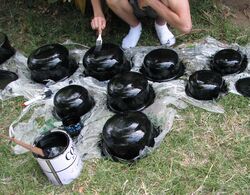
TanzSolar participants paint aluminum pots with blackboard paint for use in solar cookers.
- November 2008: Solar Cookers International recently collaborated with the upstart solar organization TanzSolar to provide a comprehensive solar presentation to 20 local professionals in Musoma. Founded by Marianne Walpert of California, USA, TanzSolar provides affordable photovoltaic solar panels to rural internet companies, individuals and small businesses in northern Tanzania, and is interested in working with SCI to spread solar cooking and solar water pasteurization in northern Tanzania. SCI’s eastern Africa staff members are currently planning a five-day solar cooking and water treatment workshop at the TanzSolar facilities in Musoma, as well as future collaborations in the region. In addition, TanzSolar has become a distributor of solar lanterns that SCI hopes to utilize in some of its project areas in the future.
- August 2008: Solar Cookers International is seeking experienced solar cooks to conduct solar cooking demonstrations in communities across the U.S. as part of the ASES National Solar Tour the largest solar energy event in the world. Saturday, October 4, 2008. More information
- August 2008: Susan Corbett writes, " A few pictures from the New Energy Station at the Democratic National Convention in Denver. We had about 10 ovens, perfect weather for solar cooking and lots and lots of people. The SunEdison aprons were donated from a local company along with the cookie dough. I wore my Solar Cookers International T- shirt and the yellow SCI hat from Kenya that Bob Metcalf sent to me. Patty and I talked a lot about SCI. Barbara Stribling (the one in the blue cowboy hat), one of SCI's early founders, also came to help. We had about 6-8 volunteers every day from 10am to 4pm. SCI provided water and snacks for the volunteers and will be picking up some of the food demo costs. The first Sunday was by far the most crowded with well over a thousand people. The rest of the week, we had several hundred a day go by. Lots and lots and lots of SCI cards, brochures, and newsletters were given away."
- June 2008: Solar Cookers International (SCI) has begun the Safe Water Project in Kenya led by SCI founder and board president Dr. Bob Metcalf, a professor of Biological Sciences at California State University, Sacramento. Bob’s development of a Portable Microbiology Laboratory (PML) will allow rural health workers and community members to test water quality in the field by assessing levels of Escherichia coli contamination. The revolutionary PML can be used anywhere by practically anyone, and it will liberate government ministries in charge of water analysis who have had difficulties gauging water quality in rural areas due to travel limitations and technical expenses. Anticipated outcomes from the project include significant reductions in the incidence of waterborne diseases in over 20 communities, and broader community awareness of simple and effective water testing and water pasteurization techniques. A training was begun in June 2008 with officials and representatives from the Kenya Water Resources Management Authority and the Kenya Ministry of Health. This is the first time that these two government ministries have collaborated on a project like this, and we are thrilled to have their participation and support. Major funding for this program has come from the Richard and Rhoda Goldman Fund, for which we are very grateful! See August 2008 article in Solar Cooker Review. A photo blog of this project is also available.
- June 2008: SCI was recently honored by the Center for African Peace and Conflict Resolution (CAPCR) at California State University Sacramento (CSUS) for bringing the benefits of solar cooking and water pasteurization to over 30,000 African families. Bob Metcalf, president of the SCI Board of Directors and professor of microbiology at CSUS accepted the award at the center’s 17th annual Africa Peace Awards dinner. Other honorees included Jeanette Ndhlovu, consul-general of South Africa; Pastor Daniel Gebreselassie, a prison reform advocate from Addis Abba, Ethiopia; and Faye Kennedy of the Sacramento-area Black Caucus/Center for Collaborative Planning. CACPR was established to provide conflict resolution and reconciliation services for agencies, governments, organizations, businesses communities and groups through training, education, research and intervention.
- February 2008: SCI was contacted by two members of the Convoy of Hope, a U.S. based NGO in Nairobi. As a result of that visit, the following took place as reported by Margaret Owino and Faustine Odaba: Faustine and the Convoy of Hope members went to the Limuru Police Station which was the temporary home of six thousand refugees. The space is small and there was congestion everywhere. People in the camp were from the BATA shoe factory, and the tea farms and they belong mainly to the Luhyia and Luo communities. The camp was organized on the basis of area of origin, for example Luos from Siaya, from Kano, Luhyias from Kakamega, from Bungoma etc. There were many missionary groups working there and pastors ministering to camp residents as well. Food donations were available and accessible and group cooking took place, in huge cooking vessels using firewood by volunteer cooks. There was a great spirit of cooperation in the camp and leaders for food distribution, leaders of water, non food items (clothes) distribution etc. Faustine and the volunteers arrived with 25 CooKit sets at 10:30 A.M. and used six CooKits for rice, seven for cabbage, two with French beans and one with water. The demonstration according to Margaret was for the leaders and other interested people. All the foods cooked by 3 P.M. Only the French beans were not well done and everyone was shocked that foods can cook without using charcoal or firewood.
- November 2007: Solar Cookers International (SCI) will undertake a two-year pilot project to increase water quality awareness and introduce the Portable Microbiology Laboratory and the Safe Water Package to communities in western Kenya. The effort will be led by SCI founder and board member Dr. Bob Metcalf, professor of Biological Sciences at California State University, Sacramento. (More information.)
- August 2006: SCI to receive World Renewable Energy Award
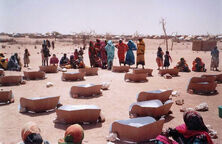
- August 2006: Solar Cookers International (SCI) is partnering with The KoZon Foundation, a Dutch charitable group, to assist Darfur refugees living in Chad. In 2004, KoZon volunteer Derk Rijks trained fifteen women in the capital, N'Djamena. He returned in early 2005, after getting approval from the United Nations High Commissioner for Refugees (UNHCR), to start a solar cooker demonstration project at Iridimi refugee camp, one of the camps hosting Darfur refugees. Marie-Rose Néloum, one of the previously trained women, took the plight of the refugees to heart and joined Rijks to train refugee women to use solar CooKits and teach others, starting in early 2005. Women responded very enthusiastically and those who learned to solar cook fulfilled their promise to teach others. CooKits were soon assembled on-site by refugee women, who earn an income through this activity. A production workshop was completed in early 2006. The workshop is located in a neutral zone of the camp, close to the offices of the camp administrator, CARE. Refugee women from each of the camp's ten zones take turns training new groups of five to six people. The refugee women at Iridimi camp, as well as head trainer Néloum and two other staff, have persevered in promoting solar cooking even as the security situation has grown increasingly unstable since April 2006. As of July 2006 Iridimi camp had 32 certified solar cooking trainers, 21 CooKit assemblers, 566 trained families, and 1200 CooKits distributed, two to four per tent. Fifty-four women were interviewed in July 2006. Thirty-nine of them solar cook every day; twelve solar cook five to six days a week; and three solar cook two to four days a week. To minimize their reliance on firewood, many families would like to maximize use of all their CooKits. However, about a quarter of the families have sold one or more of their cooking pots in exchange for precious food. SCI and The KoZon Foundation are working together to provide supplies to make CooKits, training, monitoring and accountability to brighten the lives of Darfur refugees at Iridimi camp in Chad. Groups and organizations such as the Darfur Assistance Project and Jewish World Watch, both based in southern California (USA), and many individuals have donated to SCI in support of this project. Additional logistical and communications support from UNHCR and CARE International is invaluable in continuing project operations. Barring significant disruptions, each Iridimi camp household will have two or more CooKits by early 2007.
Resources
Newsletter: Solar Cooker Review
Back issues
| Year | Spring | Summer | Fall / Winter |
| 2014 | |||
| 2013 | |||
| 2012 | |||
| 2011 | |||
| 2010 | HTML, PDF | HTML, PDF | |
| 2009 | HTML, PDF | HTML, PDF | HTML, PDF |
| 2008 | HTML, PDF | HTML, PDF | HTML, PDF |
| 2007 | HTML, PDF | HTML, PDF | HTML, PDF |
| 2006 | HTML, PDF | HTML, PDF | HTML, PDF |
| 2005 | HTML, PDF | HTML, PDF | HTML, PDF |
| 2004 | N/A | HTML, PDF | HTML, PDF |
| 2003 | HTML, PDF | HTML, PDF |
HTML, PDF |
| 2002 | HTML | HTML | HTML |
| 2001 | HTML | HTML | |
| 2000 | HTML | HTML | HTML |
| 1999 | HTML | HTML | HTML |
| 1998 | HTML, PDF | ||
| 1997 | HTML, PDF | ||
| 1996 | |||
| 1995 |
Communiqués
- July 2009: Message from the executive director
- March 2009: Message from the Executive Director
- November 2008: Message from the Executive Director
- August 2008: Message from the Executive Director
- March 2008: Message from the Executive Director
- November 2007: Message from the Executive Director
- July 2007: Message from the Executive Director
- March 2007: Message from the Executive Director
- November 2006: Message from the Executive Director
Project evaluations
- October 2007: Evaluation report on the Iridimi Refugee Camp project
- November 2004: Final Kakuma evaluation: solar cookers filled a critical gap
- 2003: An evaluation of the Solar Cookers International solar cooking program in the Ashai refugee camp in Ethiopia
Educational materials from SCI
- Solar Cookers: How to Make, Use, and Enjoy
- Trainers Manual: Teaching Solar Cooking
- Field Guide: Spreading Solar Cooking
- Solar Cookers: How to Make, Use, and Enjoy
- Advocacy handouts provided for your use by Solar Cookers International
- Event Kit: Everything you need to promote solar cooking at events. Includes Suncookers DVD (with digital copy of Solar Cookers: How to Make, Use, and Enjoy), educational posters, and 30 Solar Cooker Review back issues. Can be ordered online from Solar Cookers International.
- More materials are available here.
Annual reports
- Annual Report for 2008
- Annual Report for 2007
- Annual Report for 2006
- Annual Report for 2005
- Annual Report for 2004
Reports
- July 2008: East Africa Report - Karyn Ellis
Articles in the media
- October 2009: Kenya: Entrepreneurs Cashing in on Green Campaign - Business Daily (Nairobi)
- April 2009: Sri Lanka's Sun in a Box! - Islam Online
- April 2009: VENTURE: Integrated Solar Cooking - genV Campaigns
- April 2009: Paper and Fuel Wood Biggest Stresses on Forests - Lester Brown
- January 2009: The dish on solar cooking: Local group touts the benefits of the sun’s power - Sacramento News & Review
- August 2008: Nuts + Bolts-Cooking with Sunlight - Natural Home Magazine
- July 2008: SCI featured on "Good Day Sacramento" TV show - CBS13.com
- July 2008: Taming harsh sunrays to make cooking easy - The Standard
- June 2008: Be Green: Here comes the sun - The Record
- May 2007: Sacramento’s Solar Cookers International uses the sun to improve quality of life, one village at a time - Sacramento News Review
- March 2007: A life in the Peace Corps: Public health volunteer in Kenya - Savannah Morning News
- February 2007: Rural Kenyan women on vanguard of African solar revolution - Agence France Presse
Blog posts
- February 2009: Sun Worship and Self Reliance Report on SCI's visit to an HIV project in Kenya.
- April 2008: Black Carbon and Solar Cookers
Audio and video
- August 2009: Dr. Bob Metcalf gave a very informative interview to Kirk Hamilton PA-C, of http://www.prescription2000.com, an online resource that delivers credible nutrition research to health professionals and to the public. Listen here. There is also a transcript available.
- April 2008: World Bank audio interview with SCI's Margaret Owino
- January 2007: A video interview with SCI's Faustine Odaba at the World Social Forum in Nairobi, Kenya.
- September 2006: A video interview with SCI's Margaret Owino (Low bandwidth version here)
- October 2007: Suncookers - A DVD showing the work of Solar Cookers International in Kenya
Becoming a member of SCI
There are few important tangible benefits to being a member of Solar Cookers International. Most of our members join because of their philanthropic desire to support the work which SCI does. About the only tangible benefit to membership is receipt of our newsletter, the Solar Cooker Review. However, we provide free subscriptions to interested parties outside the United States.
There are two methods for becoming an official member of SCI. One method is to make a donation. Membership is considered valid throughout the calendar year in which the donation is made. Our standard suggested donation is US $50 per year, but any amount, larger or smaller, is sufficient. We can receive donations from outside the United States only under certain methods of payment: we can accept VISA and Mastercard credit card payments; we can accept checks written for US dollars on a US bank; we can accept International Money Orders and International Postal Money Orders if they are payable in US dollars. Such checks or money orders should be made out to "Solar Cookers International" or "SCI." Mail to:
Solar Cookers International
1919 21st Street, Suite 101
Sacramento, CA 95814
USA
You can also join or make a donation online.
The second method was devised to meet the needs of solar cooking activists and their organizations located in countries outside the USA. It was developed because we understood that in many countries the ability to donate money, particularly in US dollars, to an organization outside one's country, is limited or restricted by a variety of factors. In this method, we request two things from organizations (or individuals) who are petitioning for membership. We request a letter in which the petitioner requests membership. Along with that letter, we request some materials from the organization that relate to its activity in the solar cooker field. Some examples of these types of materials are: studies on the need for or interest level in solar cooking in the region served by the organization requesting membership; educational materials about solar cooking produced by that organization, possibly in languages local to the region the organization serves; solar cookbooks appropriate to the languages and cuisine of the region served; reports on solar cooker dissemination activities by the organization requesting membership; reports on the results of these activities, particularly number of people or families who become users of solar cookers and their comments on the benefits of solar cooking, the foods they solar cook, problems they have had with solar cooking and solutions they have invented to solve those problems. Other materials relating to the solar cooking activities of the requesting organization can also be used. To be clear, we do not ask that a petitioner send ALL these types of information—simply a sample of documents, cookbooks, etc. that the petitioner has available.
Donating to SCI
- Donate online here.
- Offset your carbon footprint by providing solar cookers to people in developing countries who need them.
- Donate your car - Donate your car using this form or call call toll free (877) 227-7487 extension 2403.
- Use your iPhone to down load this new application The ChancetoGive Foundation selected Solar Cookers International as one of the charities that will receive donations from the application's users.

Register for a Capital One SCI credit card and Solar Cookers International earns 25 dollars for each approved application and 1% of your purchases.
- Capital One SCI Credit Card Apply for a SCI credit card through Capital One. SCI earns 25 dollars for each approved application and 1% of your purchases each quarter. To place this banner on your site, insert the code from this document into your site: Code for SCI credit card banner
- Good Search / Good Shop- Search the web with GoodSearch.com and each time you do a search, GoodSearch will donate a penny to our cause! Shop online at GoodShop.com and a percentage of each purchase will be donated to our cause! More than 600 top stores are participating including Amazon, Target, Staples, Best Buy and more! Code for inserting a Good Shop banner
- Fun(d)-raising - Your group or community can support SCI, be listed in our newsletter as an organizational member, AND have fun too. Creative events people have organized include community Solarbrations, Sol Food pot-lucks and Sun Runs. For more information on events, contact Sierra Scott.
- Sell items on Ebay! SCI is a certified charity on Ebay, which means you can help fundraise for us. Visit our EBay charity page for more information.
- Donate to SOLAR COOKERS INTERNATIONAL with the Capital One No Hassle Giving Site.
- Contact Rene Hamlin at SCI's Sacramento, California office to discuss these or other options.
Contact
| Solar Cookers International 1919 21st St., Suite 101 |
Solar Cookers International East Africa Office P.O. Box 51190-00200 |
|---|
Organizational website: http://solarcookers.org
Twitter: http://twitter.com/SolarCookersInt
Facebook: http://www.facebook.com/home.php#/group.php?gid=1621390440
US Tax Exemption ID: 68-0153141
See also
- The Solar Cookers International brochure from 2007
- Solar Cookers International East Africa Office
- Safe Water Project
- Brochure showing the benefits for target groups of SCI's work
- The history of Solar Cookers International to the year 1999
- Refugee camps
- Solar Cooker Review newsletter published by Solar Cookers International


